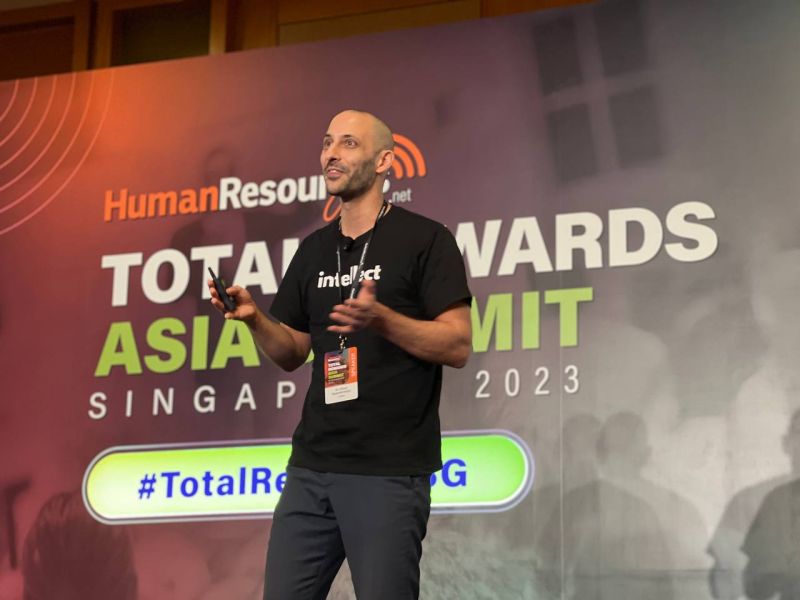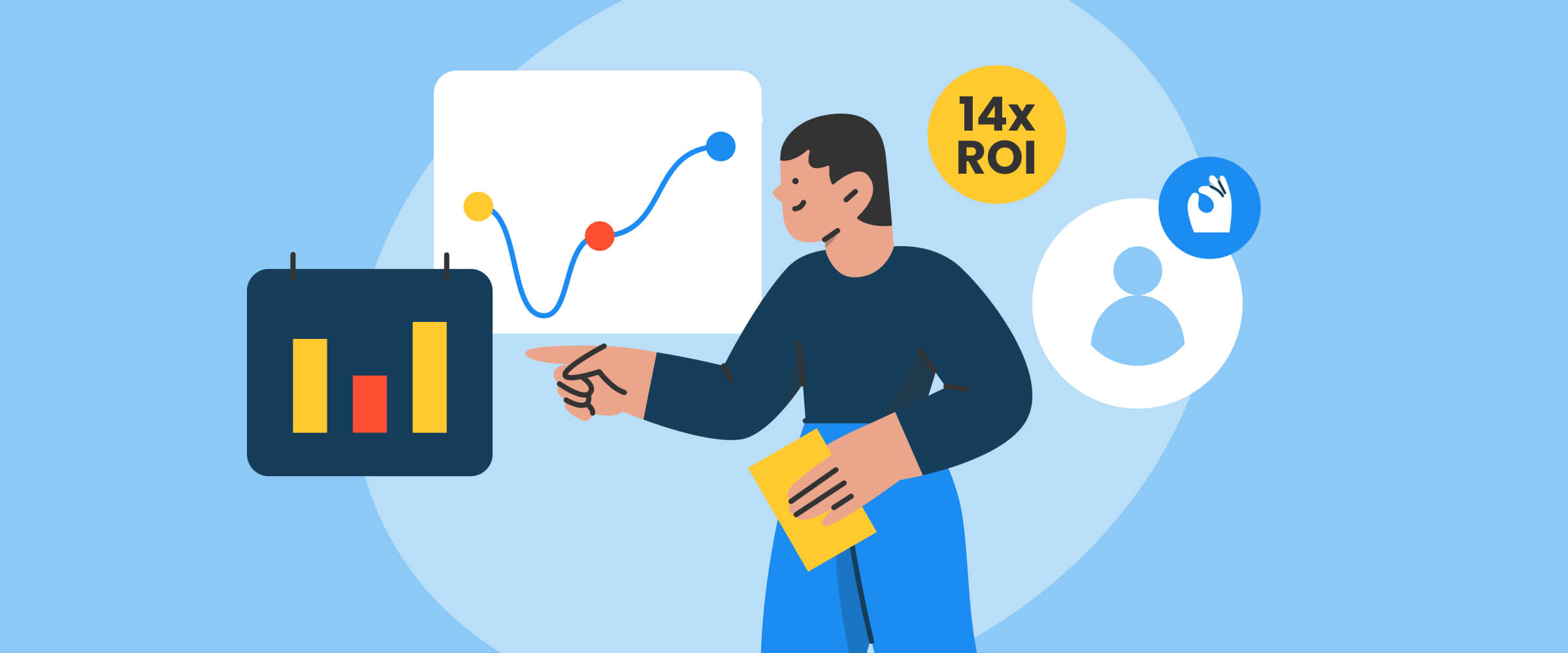A happy manager nurtures an engaged team. Combine ten such teams and you have a high-performing workforce. On the contrary, a disgruntled manager can sour team dynamics. And when ten such teams come together, it can culminate in a “toxic” workplace and an onslaught of negative Glassdoor reviews.
Employee wellbeing is beneficial to business outcomes – we don’t have to belabour that any further. But how can you know for sure that your investment in their mental health is paying off? And if it is, what’s this improvement worth in dollars and cents?
We now have the answers, thanks to a proprietary ROI calculation method derived from Intellect Dimensions.

How we developed our ROI methodology
Stage 1: Collecting data on employee wellbeing
Intellect Dimensions is a 26-item self-assessment that measures key aspects of the employee experience, ranging from their mental wellness to occupational engagement.
It provides employers with an overview of workplace wellbeing based on self-reports by employees, which take into account both their personal resources and work environment. In layman’s terms, these encompass things we can control, such as our ability to manage, as well as factors that are out of our hands, like an unprecedented increase in workload.
Intellect Dimensions plays a central role in the development of our ROI methodology, which was based on self-reports by employees across Asia.
Stage 2: Identifying the objectives of employee wellbeing
Here comes the challenge: How do you assess the monetary value of an improvement in employee wellbeing? Intuitively, we know when an organisation passes the “vibe check”. Managers and employees share positive relationships. Team members support one another. You’re getting great feedback from your customers. But within the context of the corporate bottom line, anecdotal evidence alone may not justify investments in employee wellbeing.
To help you make a compelling case, we’ve zeroed in on two key components captured by Intellect Dimensions:
1. Absenteeism: Number of days an employee misses work. In Singapore, the total costs of absenteeism due to mental health problems have been estimated to be around S$2.3 billion.
2. Presenteeism: Number of days an employee shows up but is unproductive, i.e. is physically present but unproductive. In Singapore, the total costs of presenteeism due to mental health problems have been estimated to be around S$12.8 billion.

Absenteeism is easy to measure, presenteeism isn’t, even though it’s a bigger fish to fry, with its estimated financial burden being six times higher. But first, let’s examine the causes of presenteeism and its resulting unproductivity.
Emotional wellbeing: Anxiety, depression, and emotional problems are leading contributors to work impairment associated with presenteeism. The fact that these are rarely considered valid reasons for taking time off work only worsens the situation.
Work outcomes: Other significant predictors of presenteeism include a lack of job security, job satisfaction, supervisor support, and burnout.
Workplace stigma: Perceived and self-stigma stop employees from seeking professional help when struggling with mental health issues, thus worsening their symptoms and exacerbating presenteeism.
Stage 3: Measuring the costs of absenteeism and presenteeism
Now that we’re aligned on what absenteeism and presenteeism entails, the next step is estimating their financial impact. We did this using the human capital approach, which considers:
1. The number of workdays affected by mental health issues
2. The average monthly income of employees
Let’s say you’re paying an employee S$100 to be at work. But lately, you’ve noticed something’s off. They’re showing up late, taking extended lunch breaks, and glued to their phone instead of getting things done. You decide to do a little check-in on a Friday, and find out they’ve made little progress on that report you assigned them on Monday. The cost of presenteeism for this week? S$500.

Stage 3: Calculating the ROI of your employee wellbeing program
What we’ve done so far is simply calculate the costs of absenteeism and presenteeism at a specific moment. To determine the ROI of an employee wellbeing programme, we’ll need data from two time points – one before implementing the program, and another after to assess the improvements in mental health, which we can then translate to productivity changes, and ROI.
Suppose your organisation has just commenced preparations for an audit. It’s a particularly intense quarter for all involved, with employees working overtime every other day. Now, when you calculate the numbers using the equations mentioned earlier, you arrive at S$X – the cost of absenteeism and presenteeism at the beginning of the three-month period.
The working environment has become something of a “pressure cooker”, and employee wellbeing is at rock bottom. So you encourage them to seek out Intellect’s coaches, counsellors, and psychotherapists. Six weeks pass, and despite the ongoing crunch time, you run the same calculations and discover that the costs have decreased from S$X to S$Y.

By comparing the cost difference between these two time points (i.e., S$X – S$Y), we can determine the savings in terms of reduced absenteeism and presenteeism that Intellect has helped your organisation achieve.
In our ROI study, where over 2,000 employees used Intellect over a six-week period, the improvements in absenteeism and presenteeism resulted in savings of S$3,580 and S$65,932 over the same six-week timeframe.
The final ROI for this sample is an impressive 1422%, derived from a range between 1294% to 1543% using a 95% confidence interval. In simpler terms, for every dollar you invest in Intellect’s services, you get a return of S$14 through your employee’s improved mental health and productivity, as well as lower absenteeism.
Now, the even better news: this estimate of 14x is conservative at best. Here’s why:
1. It’s based on a modest average monthly income of S$1,523.86, derived from World Bank data and applicable to Intellect’s main operating countries.
2. An even greater return on investment (greater than 14 times) is expected when more employees take advantage of coaching sessions.

What else can you do with this information?
Every industry has its unique demands, and apart from helping you quantify cost savings through reduced absenteeism and presenteeism, Intellect Dimensions also gives you an idea of where your organisation stands.
Applying this approach to the a client of Intellect’s, we can not only compare the “vitals” of a specific department with others, but also benchmark the said organisation within their industry. In a climate where a majority of Gen-Z employees would “strongly consider” leaving their current job if offered a new one with significantly better mental health benefits, having favourable outcomes will greatly enhance your recruitment and retention efforts.
Furthermore, Intellect Dimensions provides a bird’s eye view of your workforce’s strengths and weaknesses. This client in particular received high rankings in categories such as “self-awareness”, “purpose and meaning”, and “encouragement of participation”. These positive findings can be celebrated and shared in internal newsletters as morale boosters.
Conversely, organisations that find “encouraging participation” among their bottom three attributes may initiate positive change by accessing Intellect’s webinar on psychological safety. This is just one example of how Intellect Dimensions can guide your wellbeing strategies effectively.

Replicate this success for your organisation
Your workforce doesn’t have to be on the brink of burnout, and your organisation doesn’t need to be in a crisis for Intellect to make a difference.
Think of it like going to the gym and eating healthily to bolster your immunity, rather than waiting for an episode of illness to do so. Similarly, it’s wiser to build organisational resilience before employee wellbeing faces a crisis, such as during a pandemic. It’s easier to strengthen the walls before the storm than to rebuild everything when the tempest has already hit.








